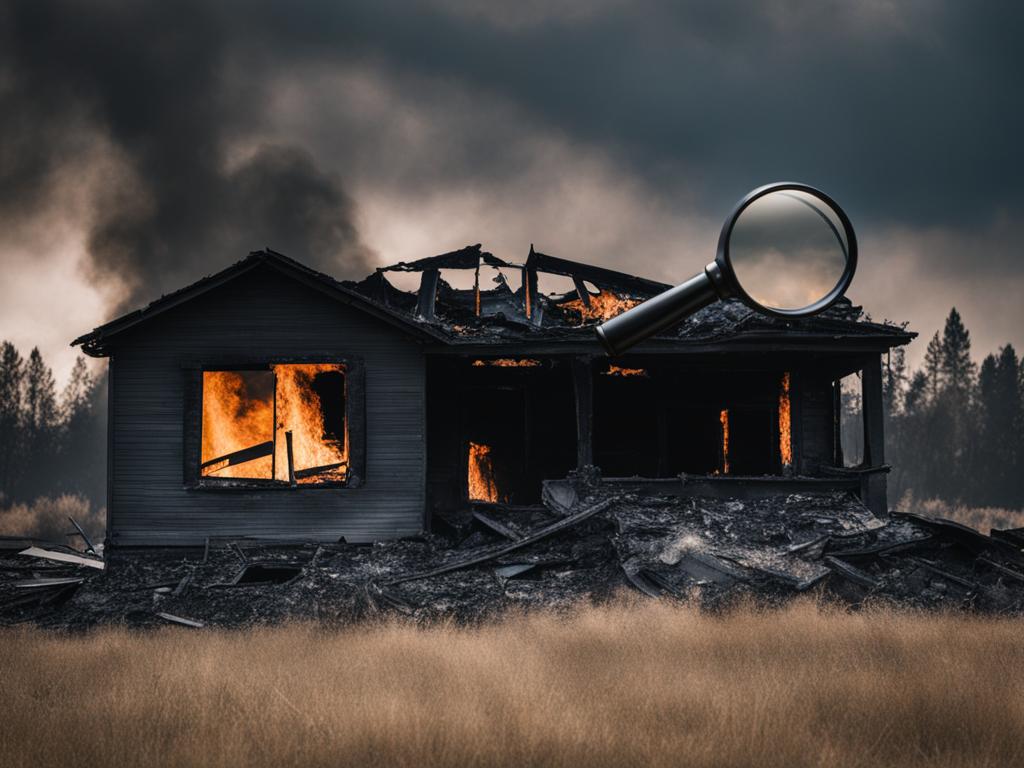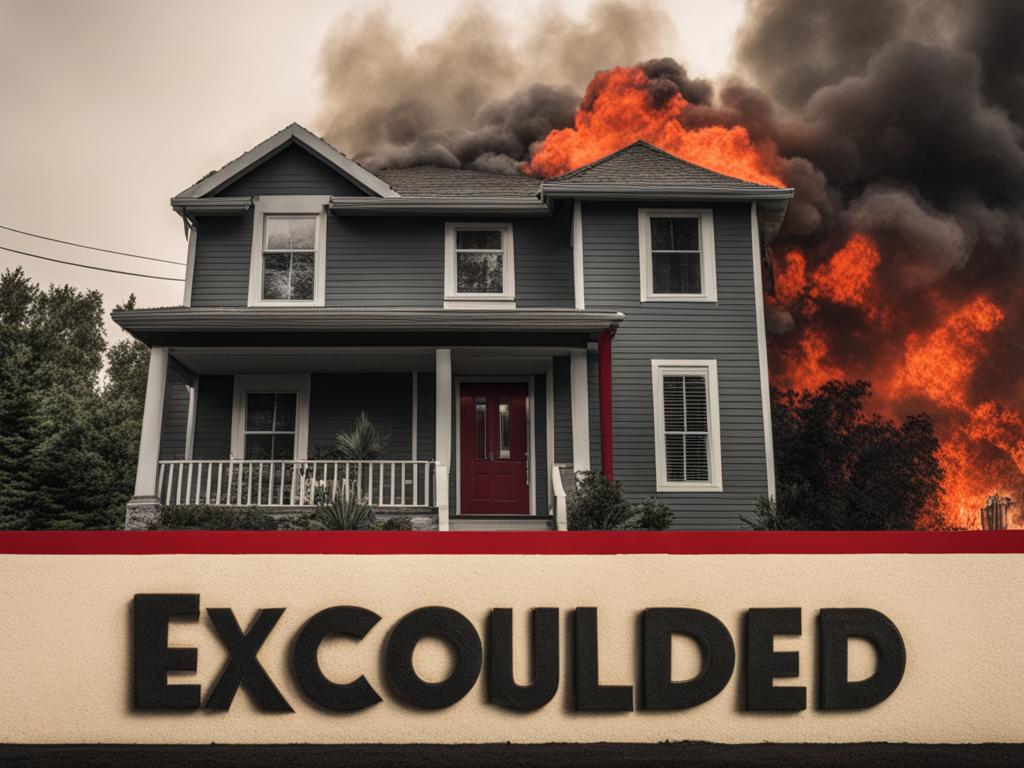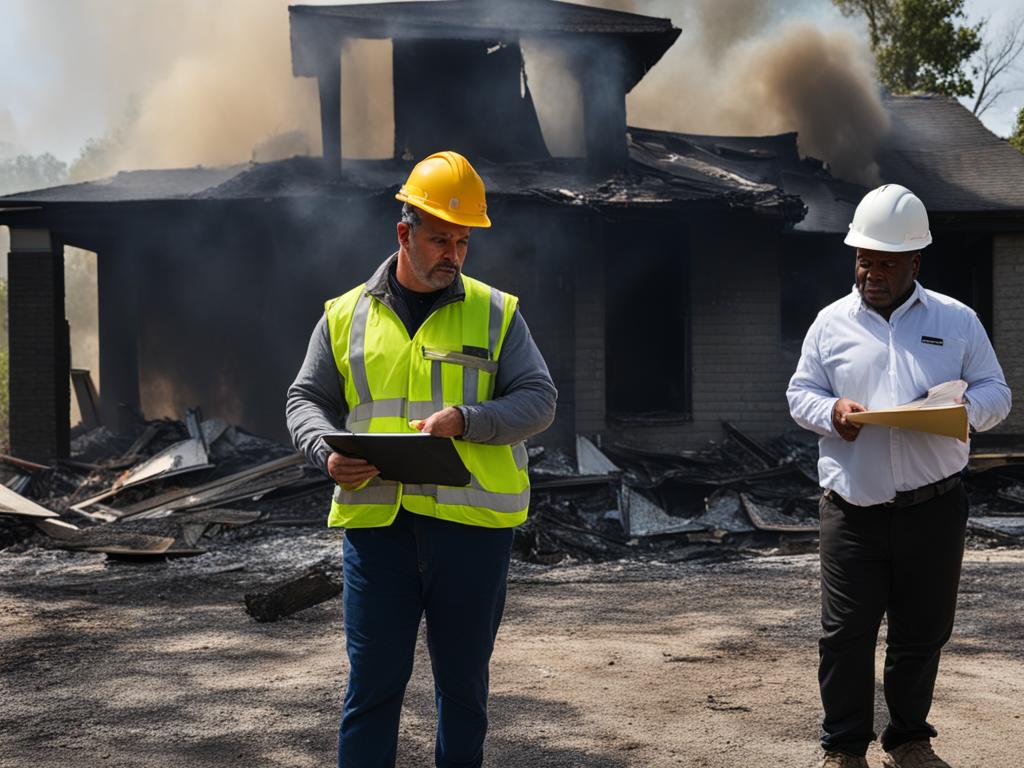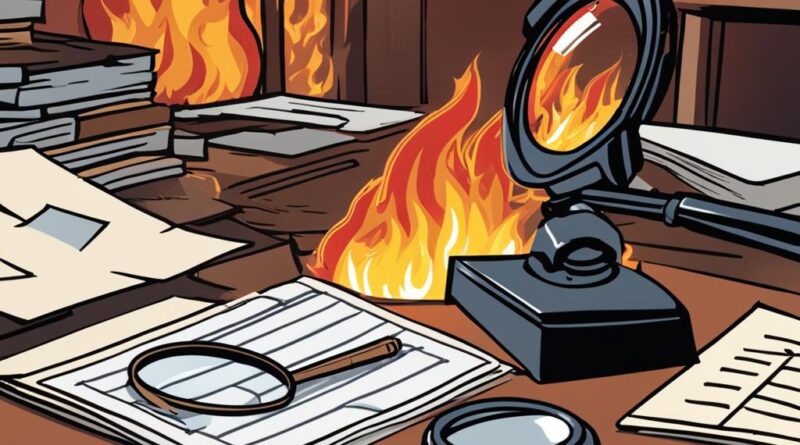Unveiling Reasons Insurance Companies Deny Fire Claims
Understanding the reasons why insurance companies deny fire claims is crucial for policyholders. By understanding common reasons for fire claim denial, individuals can better protect themselves and navigate the claims process. This section will explore the various factors that can contribute to fire claim denial, providing valuable insights for policyholders.
Key Takeaways:
- Knowing the common reasons for fire claim denial can help policyholders prepare and take steps to avoid them.
- Inconsistencies in the claim report and lack of evidence are common factors leading to fire claim denial.
- Suspicions of arson or fraudulent claims can also result in insurance companies denying fire claims.
- Understanding your fire insurance policy is essential in minimizing the chances of claim denial.
- Effective communication with insurance adjusters and appealing a claim denial are crucial in navigating the claims process.
Understanding Your Fire Insurance Policy
Before filing a fire insurance claim, it is essential to have a thorough understanding of your policy. By familiarizing yourself with the critical components of your fire insurance policy, you can better navigate the claims process and ensure that you have adequate coverage. This section will delve into key aspects of your policy that can impact claim denials, including coverage limits, deductibles, and exclusions.
Coverage Limits
One important aspect of your fire insurance policy is the coverage limit. This refers to the maximum amount the insurance company will pay for a covered loss. It is crucial to review your policy to determine if the coverage limit adequately protects you in the event of a fire. If the coverage limit is too low, you may not receive sufficient compensation to rebuild or replace your property. Understanding your coverage limits can help you make informed decisions when selecting a policy and ensure that you have the appropriate level of protection.
Deductibles
Another factor to consider is the deductible. This is the amount you are responsible for paying out of pocket before the insurance company covers the remaining costs. It is important to understand the deductible specified in your policy, as it can impact your financial responsibility in the event of a fire. Higher deductibles may lower your premium but increase your financial burden in the event of a claim, while lower deductibles may result in higher premiums. Evaluating your financial situation and risk tolerance can help you determine an appropriate deductible amount.
Exclusions
Exclusions are specific situations, events, or types of property that are not covered by your fire insurance policy. It is crucial to carefully review the exclusions listed in your policy to understand what types of fire-related incidents may not be covered. Common exclusions may include damage caused by intentional acts, certain natural disasters, or neglect. Being aware of these exclusions can help you take necessary precautions or explore additional coverage options to ensure that you have comprehensive protection for potential fire losses.
| Key Components to Understand | Definition |
|---|---|
| Coverage Limits | The maximum amount the insurance company will pay for a covered loss |
| Deductibles | The amount you are responsible for paying out of pocket before the insurance company covers the remaining costs |
| Exclusions | Situations, events, or types of property that are not covered by your fire insurance policy |
Common Reasons for Fire Claim Denial
When filing a fire insurance claim, it is disheartening to receive a denial from the insurance company. Understanding the common reasons for fire claim denial can help policyholders navigate the claims process more effectively. Below are the top reasons why insurance companies may deny fire insurance claims:
Inconsistencies in the Claim Report
One of the reasons for fire claim denial is inconsistencies found in the claim report. Insurance companies closely examine the details provided in the claim report, looking for any discrepancies or contradictions. Inaccurate information, conflicting statements, or missing documentation can give the insurance company grounds to deny the claim.
Lack of Evidence or Documentation
Another common reason for fire claim denial is the lack of sufficient evidence or documentation to support the claim. Insurance companies require policyholders to provide evidence of the damage, such as photographs, receipts, and estimates from contractors. Without proper documentation, the insurance company may argue that there is insufficient proof of the fire-related loss, leading to claim denial.
Suspicions of Arson or Fraudulent Claims
Insurance companies are vigilant when it comes to identifying potential cases of arson or fraudulent claims. If there are suspicions of intentional fire-setting or fraudulent activity, the insurance company may deny the claim. This can include cases where policyholders are suspected of purposely causing the fire or inflating the value of the loss.
By being aware of these common reasons for fire claim denial, policyholders can take proactive measures to prevent or address them. This may include providing accurate and consistent information in the claim report, ensuring thorough documentation of the damage, and cooperating fully with the insurance company’s investigation.

Having a clear understanding of these reasons can empower policyholders to navigate the claims process more effectively and increase their chances of a successful fire insurance claim.
Navigating the Claims Process
Effectively navigating the fire insurance claims process can be challenging for policyholders. Understanding the necessary steps and best practices can help increase the chances of a successful claim. Effective communication with insurance adjusters and knowing how to appeal a claim denial are crucial aspects of navigating the process.
Communicating with Insurance Adjusters
When filing a fire insurance claim, it is important to establish clear and concise communication with the insurance adjuster assigned to your case. Promptly respond to any requests for information or documentation to avoid delays in the claims process. Keep a record of all communication, including phone calls and emails, for future reference.
In your communications with the adjuster, be honest and provide accurate information about the fire incident and the damages incurred. Clearly explain the circumstances surrounding the fire and provide any supporting evidence, such as photographs or witness statements. This will help the adjuster assess the validity of your claim and expedite the process.
Appealing a Claim Denial
If your fire insurance claim is denied, it is important to understand your options for appeal. Review the denial letter carefully to understand the reasons for the denial. If you believe the decision is unjust or based on incorrect information, you have the right to appeal.
Start by gathering any additional evidence or documentation that supports your claim. This could include expert opinions, repair estimates, or new information that was not initially provided. Prepare a written appeal letter addressing each reason for denial and clearly explain why you believe your claim should be approved. Submit your appeal along with the supporting evidence to the insurance company within the specified time frame.
Understanding the Timeline
It is important to have a realistic understanding of the timeline for the claims process. Insurance companies are required to respond to your claim within a reasonable time frame, typically within 30 days. However, the entire process can take longer, especially if there are complexities or disputes involved.
Be patient and follow up with the insurance adjuster regularly to stay updated on the status of your claim. If the process is taking longer than anticipated, inquire about the reasons for the delay and seek clarification on any outstanding issues. By staying proactive and informed, you can ensure that your claim is being processed in a timely manner.
| Key Steps in Navigating the Claims Process |
|---|
| Establish clear and concise communication with the insurance adjuster assigned to your case |
| Respond promptly to any requests for information or documentation |
| Maintain a record of all communication with the adjuster |
| Provide accurate and detailed information about the fire incident and damages |
| Appeal a claim denial by gathering supporting evidence and preparing a written appeal letter |
| Understand the timeline for the claims process and follow up with the adjuster regularly |
Protecting Your Rights in the Face of Fire Loss
When it comes to fire insurance claims, protecting your rights is of utmost importance. Understanding the process and the role legal counsel can play is essential for policyholders. By being proactive and informed, individuals can navigate the complex world of insurance claims and ensure fair treatment throughout the process.
Importance of Legal Counsel
Seeking legal counsel is crucial when dealing with fire insurance claims. An experienced attorney specializing in insurance law can provide valuable guidance and advocate for your rights. They can help you understand the terms and conditions of your policy, assess the validity of the denial, and explore options for appealing the decision.
Insurance companies often have teams of adjusters and legal experts working on their side. Having a knowledgeable advocate on your side can level the playing field and increase your chances of a successful claim resolution. Legal counsel can help you navigate the intricacies of the claims process, negotiate with the insurer on your behalf, and ensure you receive the compensation you deserve.
Protecting Your Rights
Policyholders should be proactive in protecting their rights throughout the fire insurance claims process. This includes carefully documenting the damage, gathering evidence, and maintaining open and transparent communication with the insurance company. It’s important to promptly report the fire loss, adhere to reporting deadlines, and provide accurate and thorough information.
In addition, policyholders should familiarize themselves with their rights under their insurance policy and applicable state laws. Understanding the appeals process and the steps involved in challenging a claim denial can be crucial in seeking a fair resolution. By consulting with legal counsel, policyholders can gain valuable insights into their rights and take the necessary steps to protect them.
Coverage Exclusions: A Common Reason for Denial
When it comes to fire insurance claims, one common reason for denial is coverage exclusions. Insurance policies often have specific exclusions, limitations, and conditions that dictate what types of fire-related incidents are covered. It is crucial for policyholders to familiarize themselves with these exclusions to avoid any surprises during the claims process.
Insurance coverage exclusions can vary depending on the policy and insurance provider. Common exclusions may include intentional acts of arson, damage caused by natural disasters such as earthquakes or floods, and damage to unoccupied or vacant properties. It is important to review your policy carefully and understand the specific exclusions that may apply to your coverage.
Here is an example of a table that highlights some common types of fire incidents that may not be covered by insurance policies:
| Fire Incident | Coverage |
|---|---|
| Arson | Not Covered |
| Earthquake-Induced Fire | Not Covered |
| Flood-Induced Fire | Not Covered |
| Damage to Unoccupied Property | Not Covered |
It is essential to note that this table is only an example and may not reflect the specific exclusions in your insurance policy. Always refer to your policy documentation for accurate information regarding coverage exclusions.

By understanding the coverage exclusions in your fire insurance policy, you can better prepare yourself and take appropriate measures to address any gaps in coverage. In some cases, you may need to explore additional insurance options or seek specialized coverage for specific fire risks. Being aware of these exclusions can help you make informed decisions and ensure that you have the necessary coverage when you need it the most.
Misrepresentation and Underreporting Issues
Misrepresentation and underreporting can have significant consequences when it comes to fire insurance claims. Policyholders must understand the importance of providing accurate information when applying for insurance policies and throughout the claims process. Failing to do so can result in claim denials and hinder the ability to receive fair compensation for fire-related losses.
Insurance companies scrutinize policyholders’ applications and claim reports to ensure accuracy and validity. Any misrepresentation of coverage or underreporting on the insurance policy can be grounds for denial. This can include inaccurately stating the value of the insured property, failing to disclose prior fire incidents, or misrepresenting the purpose of the property (e.g., claiming a residential property as a commercial property).
Underreporting on an insurance policy is another issue that policyholders should be aware of. The failure to accurately report the value of the insured property or its contents can lead to discrepancies in coverage and potential claim denials. It is essential to provide detailed and accurate information when initially obtaining insurance coverage and to update this information whenever there are significant changes to the insured property.
Impact of Misrepresentation and Underreporting
Misrepresentation or underreporting can have severe consequences for policyholders. If an insurance company discovers inaccurate or incomplete information, they may deny a fire insurance claim or reduce the amount of compensation awarded. In some cases, the insurance company may even void the policy altogether, leaving the policyholder without any coverage for the fire loss.
Policyholders should be aware that insurance companies have access to various resources to investigate the accuracy and validity of the information provided. This can include reviewing public records, conducting site inspections, or requesting additional documentation. Any discrepancies or inconsistencies found during these investigations can be used as grounds for claim denial.
To avoid the issues associated with misrepresentation and underreporting, policyholders should ensure they provide accurate and complete information when applying for insurance policies. Additionally, it is crucial to review and update insurance policies regularly to reflect any changes in the insured property’s value or contents. By doing so, policyholders can help prevent claim denials and ensure they receive fair compensation in the event of a fire loss.
Tactics Employed by Insurance Companies
Insurance companies often employ various tactics to deny or minimize fire insurance claims. These tactics are designed to protect the company’s bottom line and reduce their financial obligations to policyholders. Understanding these tactics is crucial for policyholders to navigate the claims process effectively and ensure fair compensation. One common tactic used by insurance companies is the delay, deny, and defend strategy.
The delay, deny, and defend strategy involves prolonging the claims process, denying or delaying payment, and then defending the denial if the policyholder challenges it. This strategy allows insurance companies to stall and frustrate policyholders, hoping that they will give up or settle for a lesser amount. It is essential for policyholders to be aware of this strategy and take proactive measures to protect their rights.
Another tactic employed by insurance companies is to search for any inconsistencies or discrepancies in the policyholder’s claim report. They may use these discrepancies as a basis for denying the claim, arguing that the information provided is inaccurate or misleading. Insurance companies may also scrutinize the policyholder’s documentation and evidence, looking for any reason to question its validity.
The Importance of Seeking Legal Counsel
In light of these tactics, policyholders may find it beneficial to seek legal counsel when dealing with a fire insurance claim denial. An experienced attorney can help navigate the complex claims process, advocate for the policyholder’s rights, and ensure that the insurance company is held accountable for its actions. Legal counsel can also provide guidance on the appeals process and help policyholders understand their options for pursuing fair compensation.
In conclusion, insurance companies employ various tactics, such as the delay, deny, and defend strategy, to minimize or deny fire insurance claims. Policyholders must be aware of these tactics and take proactive measures to protect their rights. Seeking legal counsel can significantly benefit policyholders by ensuring fair treatment, advocating for their rights, and maximizing the chances of a successful claim resolution.
The Importance of Public Adjusters
When it comes to navigating the complex world of fire insurance claims, hiring a public adjuster can be a game-changer. Public adjusters are experienced professionals who work on behalf of policyholders to help them get fair compensation for their fire damage. By hiring a public adjuster, policyholders can level the playing field and ensure that their rights are protected throughout the claims process.
Working with a public adjuster offers a plethora of benefits. Firstly, public adjusters have in-depth knowledge of insurance policies and claim procedures, allowing them to effectively negotiate with insurance companies on behalf of policyholders. They understand the intricate details of fire insurance policies and can identify any loopholes or discrepancies that insurance companies may exploit to deny or minimize claims.
Public adjusters also play a crucial role in gathering evidence and documentation to support the fire insurance claim. They work diligently to assess the extent of the damage, compile a detailed inventory of losses, and present a comprehensive claim report to the insurance company. By leveraging their expertise and resources, public adjusters increase the chances of a successful fire insurance claim.
Table: Benefits of Working with a Public Adjuster
| Benefit | Description |
|---|---|
| Expert Negotiation | Public adjusters have the skills and knowledge to negotiate with insurance companies and ensure fair compensation. |
| Claims Process Assistance | They guide policyholders through the entire claims process, providing support and guidance at every step. |
| Documentation and Evidence | Public adjusters assist in gathering the necessary evidence and documentation to support the fire insurance claim. |
| Maximized Compensation | By leveraging their expertise, public adjusters work to maximize the compensation received by policyholders. |
| Time and Stress Savings | Hiring a public adjuster alleviates the burden of navigating the claims process, saving time and reducing stress for policyholders. |
Ultimately, hiring a public adjuster is a prudent decision for policyholders facing fire insurance claims. These professionals have the knowledge, experience, and resources to level the playing field with insurance companies and ensure fair compensation. By working with a public adjuster, policyholders can have peace of mind knowing that their rights and interests are being protected throughout the claims process.

Conclusion
In conclusion, understanding the reasons insurance companies deny fire claims is crucial for policyholders. By being informed about common denial reasons, policyholders can take steps to protect their rights and navigate the claims process effectively.
Hiring a public adjuster can make a significant difference in the outcome of a fire insurance claim. With their expertise and knowledge, public adjusters can help policyholders secure fair compensation and ensure that their claims are handled properly. Additionally, seeking legal counsel when needed can also greatly benefit policyholders in ensuring a fair resolution to their fire insurance claims.
Ultimately, being proactive, informed, and persistent is key to securing the compensation deserved after a devastating fire. By understanding the intricacies of fire insurance claims, policyholders can increase their chances of a successful resolution and obtain the financial support they need to recover and rebuild.
FAQ
What are the common reasons for fire claim denial?
Common reasons for fire claim denial include inconsistencies in the claim report, lack of evidence or documentation, suspicions of arson or fraudulent claims, and more.
How can I prevent my fire insurance claim from being denied?
To minimize the chances of a fire claim denial, it is crucial to have a thorough understanding of your policy, provide accurate information when applying for insurance, and ensure that you have adequate coverage.
What should I do if my fire insurance claim is denied?
If your fire insurance claim is denied, you can take steps such as appealing the decision or seeking legal assistance to dispute the denial and ensure a fair resolution.
What are coverage exclusions in fire insurance policies?
Coverage exclusions are specific conditions, limitations, or exclusions in an insurance policy that dictate what types of fire-related incidents are not covered by the insurance policy.
How can hiring a public adjuster help with my fire insurance claim?
Hiring a public adjuster can make a significant difference in the outcome of a fire insurance claim. They are experts in navigating the complex world of insurance claims and can ensure that you receive fair compensation.
What are some tactics used by insurance companies to deny fire insurance claims?
Insurance companies may employ tactics like the delay, deny, and defend strategy to deny or minimize fire insurance claims. Understanding these tactics can help policyholders navigate the claims process effectively.

